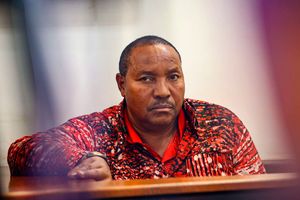Premium
Africa can benefit from China’s strategy for post-Covid world order

This photo taken on June 3, 2021 shows a resident receiving a Sinovac Covid-19 coronavirus vaccine in Rongan, in China's southern Guangxi region.
What you need to know:
- China’s post-Covid mindset is markedly different from the rest of the world.
- The Dual Circulation strategy defines Beijing’s place in the global economy for the coming decade.
China was the first country to experience the fury of the Covid-19 pandemic. It was also the first country to impose drastic measures to sucessfully contain and recover from the Covdi-19 crisis. According to China’s National Bureau of Statistics, the country’s economy grew by a record 18.3 per cent in the first quarter of 2021.
China’s post-Covid mindset is markedly different from the rest of the world. President Xi Jinping has seized the moment created by the virus to re-imagine and refashion China’s role in the post-pandemic order. The country’s re-imagination of the post-Covid world order began on February 5 this year, when the National People’s Congress passed the 14th Five-Year Economic Plan (14FYP) for the 2021-2025 period.
The centrepiece of the 14FYP is the ‘Dual Circulation Strategy’ (DCS). President Xi first unveiled the DCS during the Politburo Standing Committee Meeting of May 14, 2020. It is referred to as dual strategy because it is calibrated to tighten the link between China’s domestic economy (internal circulation) with the global economy (international circulation).
Conceptually, the blueprint is, arguably, China’s response to the real dangers of what political scientist Joseph Nye theorised as the “Kindleberger Trap”. After the devastation of World War II, Charles Kindleberger, one of the intellectual architects of the Marshall Plan, argued that the disastrous decade of the 1930s was a result of the failure by the United States to provide global public goods after it had replaced Britain as the leading power.
As its power grows, China seems to be avoiding the same mistake. Its ‘new normal’ has occurred against the backdrop of withering economic and pandemic crises in the global economy. The DCS, therefore, is China’s strategy to save the global economy from the impact of the pandemic.
The Dual Circulation strategy defines Beijing’s place in the global economy for the coming decade. The blueprint reimagines the Chinese political economy to confront the dual challenges of the fragility of the post-Covid economic outlook and the hostility of the international environment.
According to writers in the Qiushi, the Central Party School’s bi-monthly periodical, the DCS addresses three fundamental problems intensified by the pandemic. First is the declining economic growth from weaker global demand for Chinese goods and services. Second is China’s high dependency on foreign technologies in strategic sectors. The third is Beijing’s lack of monetary sovereignty due to the global dominance of the US dollar.
Beijing is keen to boost the domestic economy, encourage technological self-sufficiency and boost its ability to weather economic pressure from the US. The export bans under Donald Trump, recently re-confirmed by President Joe Biden, have taught Beijing the need to create internal technological know-how to reduce vulnerability.
Debt-fuelled infrastructure
In the next five years, the strategy will make the Chinese market extremely attractive for multinational firms and minimise overdependence on debt-fuelled infrastructure spending and exports. It will create technological self-sufficiency and transfer technology to China.
Ultimately, the strategy will enable China to replace the US and the EU as the world’s biggest consumer markets.
Underpinning the new strategy is the logic that globalisation begins at home. In a world dominated by isolationism and other anti-globalisation tendencies, the strategy fortifies China’s emerging role as the champion of globalisation in the post-pandemic global economy.
China’s post-pandemic recovery plan carries two fundamental lessons for Africa. First, an effective political party matters. The outbreak of the virus tested the epidemic preparedness and management strategies of the Communist Party of China (CPC), which marks its 100th anniversary this year.
The second lesson is that long-term political stability is an absolute condition for sustainable development. Over the past 72 years, the CPC Central Committee has united China’s 56 ethnic nationalities and maintained political stability that has underpinned China’s steady rise to become the richest and fastest developing country on Earth, with a total GDP of $15.66 trillion in 2020.
Thanks to systematic reforms and sustained fight against corruption, China is on the cusp of winning the war on poverty. So far, it has lifted more than 850 million people out of poverty. The World Bank hailed this monumental achievement as “one of the great stories in human history”. At the end of 2020, China announced that it had managed to eradicate extreme poverty, the first country in the world to achieve this feat.
The story of “Africa rising” in the new millennium is inextricably linked to that of “China rising”. Africa can benefit from China’s new strategy by increasing access to Chinese markets within the framework of the Forum on China-Africa Cooperation (FOCAC). Last year, Africa and China marked the 20th anniversary of FOCAC, which seeks to promote industrialisation and market access, among other priorities.
However, under President Joe Biden, the environment is becoming the new frontier in the West’s effort to reduce China’s sway in Africa.
The EU and the US are ratcheting up pressure on China not to fund new coal-fired power plants in Africa through the Belt and Road Initiative. Yet, without industrialisation and manufacturing, the “Africa Rising” narrative will remain a pipedream.
The FOCAC summit scheduled for Dakar, Senegal, in late 2021 offers an ideal platform for Africa to tap into China’s post-Covid recovery strategy.
Professor Peter Kagwanja is a former Government Adviser and currently Chief Executive at the Africa Policy Institute.





